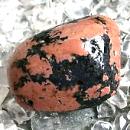|
|
||||||||||||||||
|
||||||||||||||||
|
||||||
|
|
|
|
Luxullianite
(type
of Granite)
|
|
| | |
| Discovery year unknown; IMA status: Not Valid (trade name) | ||
|
| ||
|
|
|
|
More Information |
|
|
|
|
|
|
Luxullianite
is a type of Granite. |
|
Synonyms: |
Luxulianite, Luxulyanite or Luxuliane |
|
Type Locality: |
A granite quarry near Luxulyan (Luxullian), St. Austell District, Cornwall, England, UK |
|
Year Discovered: |
Unknown; first described by T. G. Bonney in I877 |
|
Common Associations: |
Quartz, Tourmaline, alkali feldspar, brown Mica, Cassiterite |
|
More information: | |
|
|
|
|
|
|
We
have not photographed our Luxullianite
gems. Please
check back soon. |
